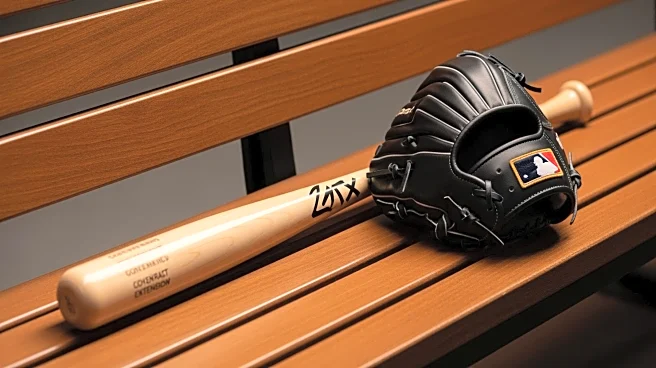What's Happening?
The Chicago Cubs have reached a new agreement with pitcher Colin Rea, extending his contract for the 2026 season with an option for 2027. The deal is valued at $6.5 million for 2026, with a club option for 2027 that
could bring the total value to $13 million. This decision comes after Rea's solid performance in the 2025 season, where he pitched 159.1 innings with a 3.95 ERA and 4.11 FIP, demonstrating league-average performance. The Cubs opted for this extension over exercising a previous option that would have cost $6 million with a $750,000 buyout. The new agreement effectively increases the Cubs' financial commitment by $500,000 in exchange for securing the 2027 option.
Why It's Important?
This contract extension is significant for the Cubs as it provides stability and flexibility in their pitching lineup. Colin Rea's ability to perform both as a starter and a reliever offers the team strategic options for the upcoming seasons. His increased fastball velocity in his mid-30s suggests he could continue to be a valuable asset. The financial structuring of the deal, with deferred payments and a buyout option, reflects the Cubs' strategic planning to manage their budget while retaining key players. This move could influence the team's decisions in the offseason, potentially affecting their pursuit of additional impact starters.
What's Next?
The Cubs will continue to evaluate their roster needs as they approach the offseason. Colin Rea's role in the 2026 season, whether as a starter or reliever, will depend on the team's overall pitching strategy and any new acquisitions. The extension provides the Cubs with a reliable option, but they may still seek to bolster their pitching staff with additional talent. The decision to extend Rea's contract could also impact negotiations with other players and influence the team's approach to free agency.
Beyond the Headlines
The extension of Colin Rea's contract highlights the Cubs' commitment to maintaining a competitive team while managing financial constraints. It underscores the importance of veteran players who can adapt to different roles, providing depth and experience. This decision may also reflect broader trends in MLB, where teams increasingly value versatility and strategic financial planning to navigate player contracts and team-building efforts.










